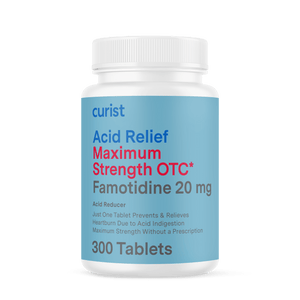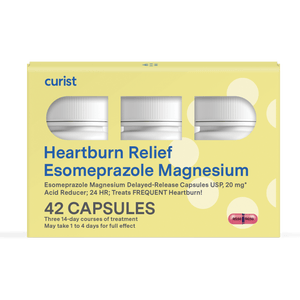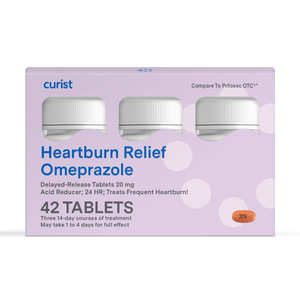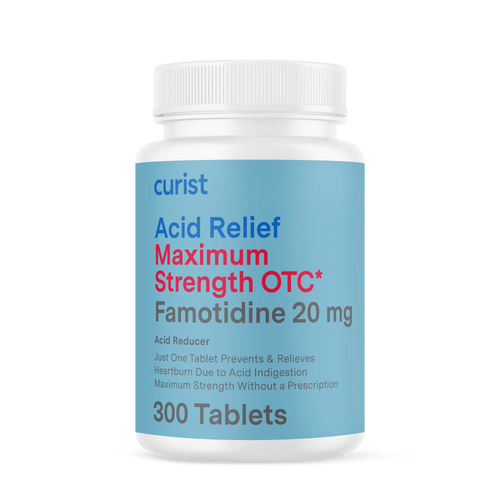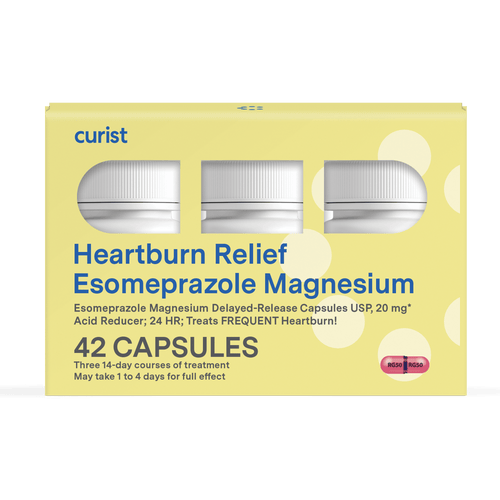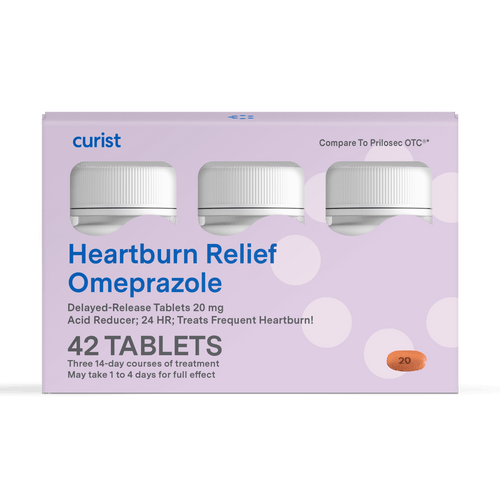By Cindy Diep, The University of Texas at Austin College of Pharmacy
Curist delivers over-the-counter medicines to your door at a fraction of the price of traditional brands. We hope everyone stays safe and healthy during this time.
In our exploration of heartburn treatment options, we will compare two commonly used medications: famotidine and pantoprazole. In this article, we aim to provide guidance for those seeking effective acid reflux management.
Are Famotidine and Pantoprazole the Same Thing? How are Pantoprazole and Famotidine Similar?
Famotidine and pantoprazole are not the same thing. However, both are used to treat acid-related conditions, such as heartburn, GERD, and ulcers. Despite being in different drug classes, both famotidine and pantoprazole work to reduce stomach acid production.
What are the Differences Between Famotidine vs Pantoprazole?
Famotidine and pantoprazole belong to different classes of medications used to treat acid-related conditions. Famotidine is a histamine-2 receptor antagonist that blocks histamine, a chemical in the body that stimulates the production of stomach acid. Pantoprazole is a proton-pump inhibitor that blocks the proton-pump in stomach cells, which is responsible for producing acid.
Both pantoprazole and famotidine also have different onsets and duration of action. Famotidine typically starts working within 1 hour of taking the medication and its effects last around 12 hours. Pantoprazole may take longer than famotidine to work, but it provides sustained acid suppression lasting up to 24 hours.
Lastly, famotidine is available over the counter at lower strengths and at higher strengths with a prescription. In contrast, pantoprazole is not sold over the counter and is only available with a prescription.
Can I Switch from Famotidine to Pantoprazole? Can I Switch from Pantoprazole to Famtodine?
Switching from famotidine to pantoprazole is possible, but should be done under the guidance of a healthcare professional. For example, if you’re currently taking famotidine and your symptoms are not adequately controlled, or if your healthcare provider determines that pantoprazole may be a better option, your provider could recommend switching to pantoprazole. On the other hand, if you experience side effects or intolerance with pantoprazole, your provider may recommend switching to famotidine. Keep in mind that pantoprazole is only available by prescription and is not a medication that can be purchased over the counter.
Which is Stronger: Famotidine or Pantoprazole?
In terms of acid suppression, pantoprazole is considered to be stronger than famotidine. Pantoprazole provides long-lasting acid suppression, with effects that can last up to 24 hours. Famotidine’s effects are typically shorter and typically last up to 12 hours. However, the choice between famotidine and pantoprazole depends on various factors and it is essential that you consult with a healthcare professional to determine which medication is best for you.
Can I Take Pantoprazole and Famotidine Together? Is it OK to Take Pantoprazole in the Morning and Famotidine at Night?
Taking famotidine and pantoprazole together is not recommended without consulting a healthcare professional. Both medications work to reduce stomach acid and taking them together may increase the risk of side effects. However, there may be situations where a healthcare provider prescribes both famotidine and pantoprazole together.
Yes, you could take pantoprazole in the morning and famotidine at night. However, there are limited studies investigating this approach. It is important to follow the instructions provided by your healthcare provider and always inform your healthcare provider about all the medications you are taking to avoid potential interactions or adverse effects.
Which is Best for Heartburn or Acid Reflux: Famotidine or Pantoprazole?
Determining whether famotidine or pantoprazole is best for heartburn or acid reflux depends on various factors, including the severity of symptoms, individual medical history, and more. Famotidine is often used for milder cases of heartburn or as maintenance therapy for GERD. In contrast, pantoprazole is commonly prescribed for more severe or persistent cases of GERD or erosive esophagitis. The choice between famotidine and pantoprazole should be made in consultation with a healthcare provider.
Which is Best for Long-Term Use: Famotidine or Pantoprazole?
Neither famotidine or pantoprazole should be used long-term without speaking to your doctor first. For example, famotidine purchased over the counter should not be used longer than 14 days if you are self-medicating to treat heartburn symptoms. Pantoprazole has been effective for long-term use, but there are concerns about potential risks associated with long-term proton-pump inhibitor use, such as risk of fractures, kidney disease, and vitamin deficiencies. Therefore, speak to a healthcare provider to determine whether pantoprazole or famotidine can be taken long-term based on your individual needs and response to treatment.
Which is Best for Ulcers: Pantoprazole or Famotidine?
Although famotidine can be used to treat ulcers, current guidelines recommend proton-pump inhibitors, such as pantoprazole, as the standard for treatment of peptic ulcer disease. Famotidine is usually effective for short-term treatment of ulcers and pantoprazole is typically effective for both short-term and long-term treatment of ulcers. In general, proton-pump inhibitors work better at healing and preventing stomach ulcers than famotidine. Consult with a healthcare professional for personalized advice regarding the most appropriate medication for treating ulcers.
Is Famotidine Safer than Pantoprazole? Is Pantoprazole Safer than Famotidine?
Both famotidine and pantoprazole are considered safe when used according to the instructions provided on the packaging or by a healthcare professional. Famotidine is generally well-tolerated and has less potential drug interactions or adverse effects compared to proton-pump inhibitors like pantoprazole. Pantoprazole may have more potential drug interactions compared to famotidine and long-term use may be associated with adverse events, including bone fractures, vitamin and mineral deficiencies, and kidney disease. Overall, both famotidine and pantoprazole are considered safe and effective medications, but it is important to speak with your doctor to determine the appropriate medication and dosage regimen for your condition.




